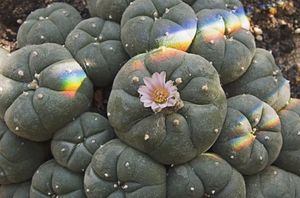Peyote
Peyote is a small, spineless cactus known scientifically as Lophophora williamsii. It is native to parts of southwestern Texas and Mexico. The plant has a long history of traditional and religious use among indigenous peoples, particularly in the Native American Church.
The main psychoactive compound in peyote is mescaline, a hallucinogenic alkaloid. When consumed, mescaline can induce altered perceptions, vivid visual experiences, and changes in thought processes. Peyote has been used in religious ceremonies, particularly by Native American tribes, for centuries. It is considered a sacrament in the Native American Church, where its use is protected by U.S. law for religious purposes.
In addition to its traditional and religious use, peyote has been a subject of interest in the study of consciousness and psychoactive substances. It is worth noting that the use of peyote is not without controversy, and there are legal restrictions on its possession and use in many places. In some regions, there are exceptions for its use in specific religious ceremonies. Always be aware of and comply with local laws and regulations regarding the use of substances like peyote.
